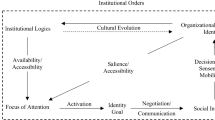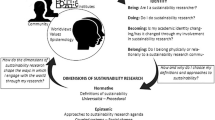Abstract
Both sustainability and identity are said to be paradoxical issues in organizations. In this study we look at the paradoxes of corporate sustainability at the individual level by studying the identity work of those managers who hold sustainability-dedicated roles in organizations. Analysing 26 interviews with sustainability managers, we identify three main tensions affecting their identity construction process: the business versus values oriented, the organizational insider versus outsider and the short-term versus long-term focused identity work tensions. When dealing with these tensions, some interviewees express a paradoxical perspective in attempting to accept and maintain the two poles of each of them simultaneously. It emerges in particular that metaphorical reasoning can be used by sustainability managers in varied ways to cope with the tensions of identity work. We read these findings in light of the existing literature on the relation between paradoxes and identity work, highlighting and discussing their implications for both research and practice.
Similar content being viewed by others
Change history
29 June 2017
An erratum to this article has been published.
References
Aguinis, H., & Glavas, A. (2012). What we know and don’t know about corporate social responsibility a review and research agenda. Journal of Management, 38(4), 932–968.
Allen, S., Marshall, J., & Easterby-Smith, M. (2015). Living with contradictions: The dynamics of senior managers’ identity tensions in relation to sustainability. Organization & Environment, 28(3), 328–348.
Alvesson, M. (2003). Beyond neopositivists, romantics, and localists: A reflexive approach to interviews in organizational research. Academy of Management Review, 28(1), 13–33.
Alvesson, M. (2010). Self-doubters, strugglers, storytellers, surfers and others: Images of self-identities in organization studies. Human Relations, 63(2), 193–217.
Alvesson, M., & Willmott, H. (2002). Identity regulation as organizational control: Producing the appropriate individual. Journal of Management Studies, 39(5), 619–644.
Alvesson, M., Ashcraft, K. L., & Thomas, R. (2008). Identity matters: Reflections on the construction of identity scholarship in organization studies. Organization, 15(1), 5–28.
Banerjee, S. B. (2001). Managerial perceptions of corporate environmentalism: Interpretations from industry and strategic implications for organizations. Journal of Management Studies, 38(4), 489–513.
Banerjee, S. B. (2011). Embedding sustainability across the organization: A critical perspective. Academy of Management Learning & Education, 10(4), 719–731.
Bansal, P. (2005). Evolving sustainably: A longitudinal study of corporate sustainable development. Strategic Management Journal, 26(3), 197–218.
Beech, N., Gilmore, C., Hibbert, P., & Ybema, S. (2016). Identity-in-the-work and musicians’ struggles: The production of self-questioning identity work. Work, Employment & Society, 30(3), 506–522.
Brown, A. D. (2015). Identities and identity work in organizations. International Journal of Management Reviews, 17(1), 20–40.
Brown, A. D., Stacey, P., & Nandhakumar, J. (2008). Making sense of sensemaking narratives. Human Relations, 61(8), 1035–1062.
Clarke, C. A., Brown, A. D., & Hope-Hailey, V. (2009). Working identities? Antagonistic discursive resources and managerial identity. Human Relations, 62(3), 323–352.
Clegg, S. R., Cuhna, J. V., & Cuhna, M. P. (2002). Management paradoxes: A relational view. Human Relations, 55(5), 483–503.
Crane, A. (2000). Corporate greening as amoralization. Organization Studies, 21(4), 673–696.
Creed, W. D., Scully, M. A., & Austin, J. R. (2002). Clothes make the person? The tailoring of legitimating accounts and the social construction of identity. Organization Science, 13(5), 475–496.
Creed, W. D., DeJordy, R., & Lok, J. (2010). Being the change: Resolving institutional contradiction through identity work. Academy of Management Journal, 53(6), 1336–1364.
Cunliffe, A. L. (2009). A very short, fairly interesting and reasonably cheap book about management. London: Sage.
Dameron, S., & Torset, C. (2014). The discursive construction of strategists’ subjectivities: Towards a paradox lens on strategy. Journal of Management Studies, 51(2), 291–318.
Down, S., & Reveley, J. (2009). Between narration and interaction: Situating first-line supervisor identity work. Human Relations, 62(3), 379–401.
Driver, M. (2006). Beyond the stalemate of economics versus ethics: Corporate social responsibility and the discourse of the organizational self. Journal of Business Ethics, 66(4), 337–356.
Elkington, J. (1997). Cannibals with forks: The triple bottom line of 21st century business. Gabriola Island, BC: New Society.
Ellis, N., & Ybema, S. (2010). Marketing identities: Shifting circles of identification in inter-organizational relationships. Organization Studies, 31(3), 279–305.
Eubanks, D. L., Brown, A. D., & Ybema, S. (2012). Leadership, identity and ethics. Journal of Business Ethics, 107(1), 1–3.
Forbes, L. C., & Jermier, J. M. (2010). The new corporate environmentalism and the ecology of commerce. Organization & Environment, 23(4), 465–481.
Ghadiri, D. P. (2010). Moral identity struggles in organizations: The case of a management consulting company. Doctoral dissertation, Cambridge: University of Cambridge.
Ghadiri, D. P., Gond, J. P., & Brès, L. (2015). Identity work of corporate social responsibility consultants: Managing discursively the tensions between profit and social responsibility. Discourse and Communication, 9(6), 593–624.
Gherardi, S. (2000). From organizational learning to practice-based knowing. Human Relations, 54(1), 1057–1080.
Gotsi, M., Andriopoulos, C., Lewis, M., & Ingram, A. (2010). Creative workers: Managing tensions of multiple identities. Human Relations, 63(6), 781–805.
GreenBiz (2013). State of the profession. Available at: https://www.greenbiz.com/research/report/2013/01/07/state-profession-2013.
Guest, G., MacQueen, K. M., & Namey, E. E. (2012). Applied thematic analysis. Thousands Oak, CA: Sage.
Hahn, T., Preuss, L., Pinkse, J., & Figge, F. (2014). Cognitive frames in corporate sustainability: Managerial sensemaking with paradoxical and business case frames. Academy of Management Review, 39(4), 463–487.
Hahn, T., Pinkse, J., Preuss, L., & Figge, F. (2015). Tensions in corporate sustainability: Towards an integrative framework. Journal of Business Ethics, 127(2), 297–319.
Hahn, T., Figge, F., Aragón-Correa, J. A., & Sharma, S. (2017). Advancing research on corporate sustainability: Off to pastures new or back to the roots? Business and Society, 56(2), 155–185.
Hallier, J., & Summers, J. (2011). Dilemmas and outcomes of professional identity construction among students of human resource management. Human Resource Management Journal, 21(2), 204–219.
Harding, N., Lee, H., & Ford, J. (2014). Who is ‘the middle manager’? Human Relations, 67(10), 1213–1237.
Hay, A. (2014). I don’t know what I am doing!: Surfacing struggles of managerial identity work. Management Learning, 45(5), 509–524.
Humphreys, M., & Brown, A. D. (2002). Narratives of organizational identity and identification: A case study of hegemony and resistance. Organization Studies, 23(3), 421–447.
Jermier, J. M., & Forbes, L. C. (2016). Metaphors, organizations and water: Generating new images for environmental sustainability. Human Relations, 69(4), 1001–1027.
Jones, D. R. (2016). The ‘biophilic organization’: An integrative metaphor for corporate sustainability. Journal of Business Ethics, 138(3), 401–416.
Knights, D., & Willmott, H. (1999). Management lives: Power and identity in work organizations. Thousand Oaks, CA: Sage.
Koning, J., & Waistell, J. (2012). Identity talk of aspirational ethical leaders. Journal of Business Ethics, 107(1), 65–77.
Kram, K. E., Wasserman, I. C., & Yip, J. (2012). Metaphors of identity and professional practice: Learning from the scholar-practitioner. The Journal of Applied Behavioral Science, 48(3), 304–341.
Lähdesmäki, M. (2012). Construction of owner-manager identity in corporate social responsibility discourse. Business Ethics: A European Review, 21(2), 168–182.
Lewis, M. W. (2000). Exploring paradox: Toward a more comprehensive guide. Academy of Management Review, 25(4), 760–776.
Linnenluecke, M. K., & Griffiths, A. (2010). Corporate sustainability and organizational culture. Journal of World Business, 45(4), 357–366.
Martin, B., & Wajcman, J. (2004). Markets, contingency and preferences: Contemporary managers’ narrative identities. The Sociological Review, 52(2), 240–264.
Mauthner, N. S., & Doucet, A. (2003). Reflexive accounts and accounts of reflexivity in qualitative data analysis. Sociology, 37(3), 413–431.
McInnes, P., & Corlett, S. (2012). Conversational identity work in everyday interaction. Scandinavian Journal of Management, 28(1), 27–38.
McKinley, W. (2003). From subjectivity to objectivity: A constructivist account of objectivity in organization theory. In R. Westwood & S. R. Clegg (Eds.), Debating organization: Point-counterpoint in organization studies (pp. 142–156). London: Blackwell.
Miles, M. B., & Huberman, A. M. (1994). Qualitative data analysis: An expanded sourcebook. Thousand Oaks, CA: Sage.
Morgan, G. (1980). Paradigms, metaphors and puzzle solving in organization theory. Administrative Science Quarterly, 25(4), 605–622.
Musson, G., & Duberley, J. (2007). Change, change or be exchanged: The discourse of participation and the manufacture of identity. Journal of Management Studies, 44(1), 143–164.
Nyberg, D., & Sveningsson, S. (2014). Paradoxes of authentic leadership: Leader identity struggles. Leadership, 10(4), 437–455.
Oswick, C., Keenoy, T., & Grant, D. (2002). Note: Metaphor and analogical reasoning in organization theory: Beyond orthodoxy. Academy of Management Review, 27(2), 294–303.
Petriglieri, G. P., & Petriglieri, J. L. (2010). Identity workspaces: The case of business schools. Academy of Management Learning and Education, 9(1), 44–60.
Phillips, M. (2013). On being green and being enterprising: Narrative and the ecopreneurial self. Organization, 20(6), 794–817.
Poole, M. S., & Van de Ven, A. H. (1989). Using paradox to build management and organization theories. Academy of Management Review, 14(4), 562–587.
Pritchard, K. (2010). Becoming an HR strategic partner: Tales of transition. Human Resource Management Journal, 20(2), 175–188.
Putnam, L. L., Fairhurst, G. T., & Banghart, S. (2016). Contradictions, dialectics, and paradoxes in organizations: A constitutive approach. The Academy of Management Annals, 10(1), 65–171.
Rego, A., e Cunha, M. P., & Polónia, D. Corporate sustainability: A view from the top. Forthcoming in Journal of Business Ethics, 1–25.
Sims, D. (2003). Between the millstones: A narrative account of the vulnerability of middle managers’ storying. Human Relations, 56(10), 1195–1211.
Slawinski, N., & Bansal, P. (2015). Short on time: Intertemporal tensions in business sustainability. Organization Science, 26(2), 531–549.
Smith, W. K., & Lewis, M. W. (2011). Toward a theory of paradox: A dynamic equilibrium model of organizing. Academy of Management Review, 36(2), 381–403.
Smith, W. K., & Lewis, M. W. (2012). Leadership skills for managing paradoxes. Industrial and Organizational Psychology, 5(2), 227–231.
Strand, R. (2014). Strategic leadership of corporate sustainability. Journal of Business Ethics, 123(4), 687–706.
Sveningsson, S., & Alvesson, M. (2003). Managing managerial identities: Organizational fragmentation, discourse and identity struggle. Human Relations, 56(10), 1163–1193.
Tams, S., & Marshall, J. (2011). Responsible careers: Systemic reflexivity in shifting landscapes. Human Relations, 64(1), 109–131.
Vaara, E., Tienari, J., & Säntti, R. (2003). The international match: Metaphors as vehicles of social identity-building in cross-border mergers. Human Relations, 56(4), 419–451.
Van der Byl, C. A., & Slawinski, N. (2015). Embracing tensions in corporate sustainability: A review of research from win-wins and trade-offs to paradoxes and beyond. Organization and Environment, 28(19), 54–79.
Visser, W., & Crane, A. (2010). Corporate sustainability and the individual: Understanding what drives sustainability professionals as change agents. Working Paper. Available at: http://ssrn.com/abstract=1559087.
Waldman, D. A., & Bowen, D. E. (2016). Learning to be a paradox-savvy leader. The Academy of Management Perspectives, 30(3), 316–327.
Watson, T. J. (2008). Managing identity: Identity work, personal predicaments and structural circumstances. Organization, 15(1), 121–143.
Watson, T. J. (2009). Narrative, life story and manager identity: A case study in autobiographical identity work. Human Relations, 62(3), 425–452.
Weinreb Group (2011). CSO back history: How chief sustainability officers reached the C-suite. Available at http://weinrebgroup.com/wp-content/uploads/2011/09/CSO-Back-Story-by-Weinreb-Group.pdf.
Wickert, C., & Schaefer, S. (2015). Towards a progressive understanding of performativity in critical management studies. Human Relations, 68(1), 107–130.
Wright, C., & Nyberg, D. (2012). Working with passion: Emotionology, corporate environmentalism and climate change. Human Relations, 65(12), 1561–1587.
Wright, C., Nyberg, D., & Grant, D. (2012). “Hippies on the third floor”: Climate change, narrative identity and the micro-politics of corporate environmentalism. Human Relations, 33(11), 1451–1475.
Ybema, S., Keenoy, T., Oswick, C., Beverungen, A., Ellis, N., & Sabelis, I. (2009). Articulating identities. Human Relations, 62(3), 299–322.
Zhang, Y., Waldman, D. A., Han, Y. L., & Li, X. B. (2015). Paradoxical leader behaviors in people management: Antecedents and consequences. Academy of Management Journal, 58(2), 538–566.
Acknowledgements
The authors would like to thank Professor Sierk Ybema and Professor Stefan Sveningsson for their comments on earlier versions of this article.
Author information
Authors and Affiliations
Corresponding author
Additional information
The original version of this article has been revised: The layout of the column sub-headings in Table 3 has been corrected.
An erratum to this article is available at https://doi.org/10.1007/s10551-017-3615-2.
Rights and permissions
About this article
Cite this article
Carollo, L., Guerci, M. ‘Activists in a Suit’: Paradoxes and Metaphors in Sustainability Managers’ Identity Work. J Bus Ethics 148, 249–268 (2018). https://doi.org/10.1007/s10551-017-3582-7
Received:
Accepted:
Published:
Issue Date:
DOI: https://doi.org/10.1007/s10551-017-3582-7




